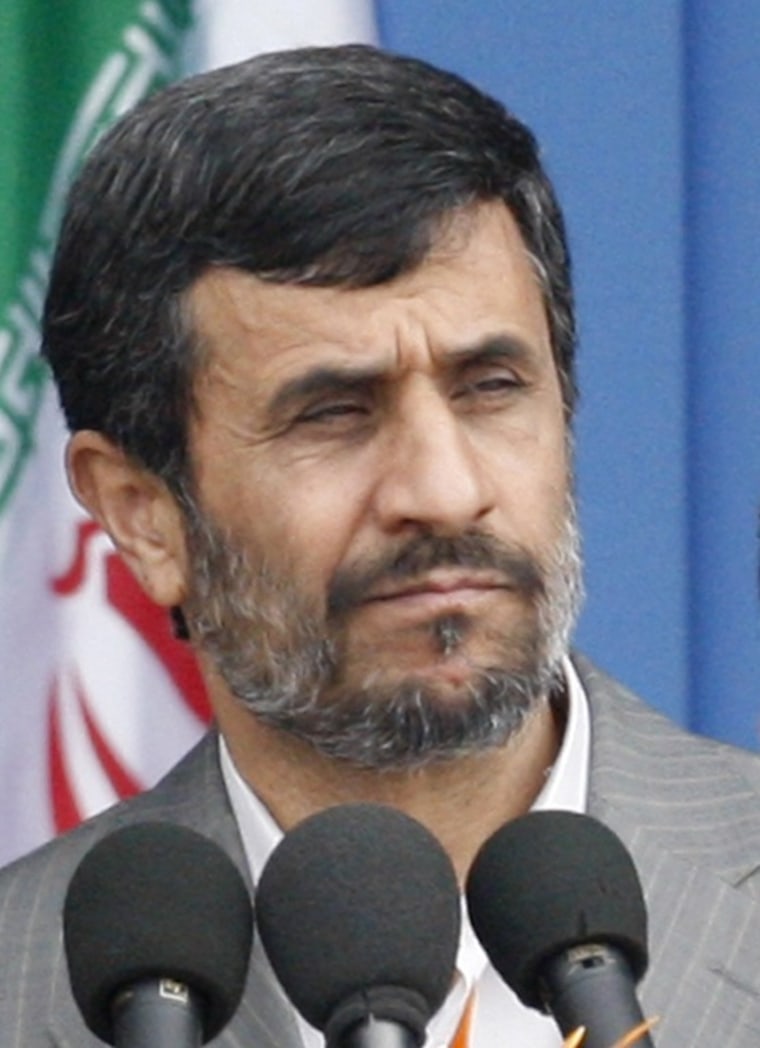Iran's president Monday called the veto power held by the U.S. and other permanent Security Council members a "satanic tool."
The remark came as Washington and its allies pressed for a fourth round of U.N. penalties on Iran for its refusal to halt a key part of its nuclear program that could be used to make nuclear weapons. Iran says it only wants the technology for producing nuclear power.
In a speech to a gathering of policemen in Tehran, President Mahmoud Ahmadinejad said the veto rights giving the five nations more power than others on the council were an instrument of suppression.
"The world community doesn't need atomic bombs ... the Security Council or veto rights. These things are all for suppressing and destroying the nature of mankind and are satanic tools to keep human beings away from culture and morality," Ahmadinejad said, according to state television.
Iran reveals centrifuge purchase
In a revelation likely to add to the suspicions of Washington and its allies, a former foreign minister, Ali Akbar Velayati, was quoted as telling a newspaper that Iran obtained its first centrifuge from Pakistan in 1986.
It was Iran's first public confirmation of a clandestine transfer of nuclear technology specifically from Pakistan, which itself had already acknowledged the nuclear sales. Centrifuges, which purify uranium gas, are the central component of a process that can make fuel for power plants or — at higher levels of processing — weapons.
Iran's nuclear work remained a secret until 2003, when the U.N.'s nuclear monitoring agency began investigating the program. Its work and Iran's assurances that it only has peaceful motives have failed to quell the international concern and suspicion.
The timing of the new revelation was unusual, as Iran is in the middle of a diplomatic sprint around the globe to try to persuade other U.N. Security Council members to oppose new sanctions.
Washington finds reluctance on sanctions push
In Washington, State Department spokesman P.J. Crowley said officials were meeting daily at the United Nations in an effort to push through a new package of penalties "as rapidly as possible."
He said Secretary of State Hillary Rodham Clinton had called several foreign officials over the weekend, including Russian Foreign Minister Sergey Lavrov.
"Iran needs to come forward and answer the questions the international community has about its nuclear program," Crowley said.
Besides the U.S., the other permanent council members are Britain, France, Russia and China.
Russia and China, which both have important commercial links to Iran, have so far been reluctant to support new sanctions.
Iran's Foreign Minister Manouchehr Mottaki held talks with Bosnian leaders Monday after making little progress in Austria over the weekend in Tehran's effort to convince non-permanent Security Council members to oppose sanctions.
"We do believe that the Security Council should try to democratize itself, to give the chance to all members to think and consider and make decisions on the basis of their own analysis," Mottaki said in Sarajevo.
Ahmadinejad visited Uganda, another non-permanent member of the 15-nation council, last week.
Ex-official details Pakistan trip
Velayati, Iran's former foreign minister, said he flew in a private plane to Islamabad to personally receive Iran's first centrifuge.
"I think it was in 1986 when we traveled to Pakistan on a private plane. We were told there was a mission that I had to take to Iran. We took it to Iran and later learned that it was a centrifuge. ... We didn't tell Pakistani authorities about it," Velayati was quoted as saying by the weekly Panjereh.
After years of denials, Pakistan admitted in 2005 that its top nuclear scientist, Abdul Qadeer Khan, sold crucial equipment to Iran, but it said it knew nothing of his activities when they occurred.
Iran has in the past confirmed that it purchased nuclear equipment from international dealers, including some from the Indian subcontinent, but Velayati's revelation was the first public acknowledgment that Iran obtained its first centrifuge machine from Pakistan.
Velayati, now a top adviser to Iran's Supreme Leader Ayatollah Ali Khamenei, said he didn't meet Khan in person but that the disgraced father of Pakistan's nuclear bomb "didn't have any unpleasant opinion about Iran."
